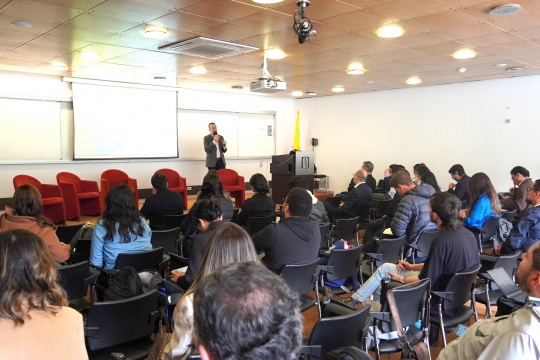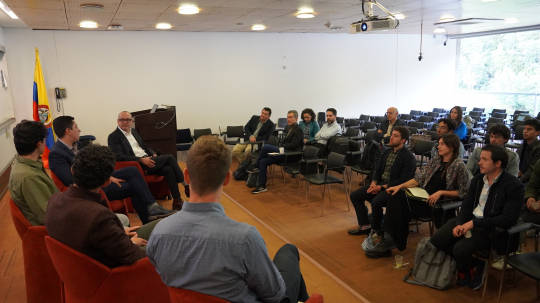Researchers and stakeholders discussed these challenges at an event at Los Andes University in Bogotá. They agreed that universities have an important role in providing scientific-based information and gathering social actors to work on these topics collectively.
The event Research for the Energy Transition Action on June 11th led by Santiago Arango and Jorge Bonilla (EfD Colombia) gathered researchers from 7 universities (National University of Colombia, Los Andes University, University of Berkeley, University of Oxford, University of Santa Barbara, Lehigh University, University of Vienna), plus representatives from the National Agency of Energy and Ministry of Mines and Energy from Brazil, the Ministry of Mines and Energy and the unity for energy planning and the electricity dispatch center from Colombia, and the private energy industry in Colombia to discuss energy security and renewable energy as the two most challenging subjects for achieving energy transition.
Comparing experiences between countries
Presenters described experiences from Mexico, Brazil, and Colombia. Cesar Martínez Alvarez, a Professor at the University of Santa Barbara described the politics of energy transition in Mexico. Oil-producing regions are sensitive to messages that promote the fossil fuel industry, for instance during presidential elections, which hampers the energy transition.
Bruno Goulart de Freitas Machado, a representative from ANEEL (Brazilian National Agency of Energy), explained how Brazil has changed its energy matrix by diminishing hydropower and increasing solar, wind, biomass, and thermal energy. The main challenge is the cost of location, being a very large country. 87% of electricity generation in Brazil is renewable.
Carlos Arturo Vanegas, a representative from XM (National Dispatch Center), summarized the challenges of Colombia’s electric system, including energy sufficiency, power flexibility, transport capacity, and security. These issues affect the readiness for meteorological phenomena such as La Niña or El Niño. The system needs regulatory and technical changes to improve its adaptability to climate.
Investments needed to achieve energy security
After the presentations, there was a roundtable discussion featuring Jessica Arias (Colombian National Planning of Mining and Energy, UPME), Raul Lancheros (Colombian Guild of Electricity Generators – Acolgen), Carlos Arturo Vanegas (XM), Jairo Espinosa (National University of Colombia) and Bruno Goulart de Freitas Machado (ANEEL). They discussed the regulatory challenges of the electricity market in Colombia. Regulatory reforms in Colombia are difficult to achieve when only one of four commissioners is formally appointed. Colombia needs security investments, storage, energy efficiency, and transmission investments, but there is uncertainty over the system’s future.
Challenges to renewable energy
Thiago Barral, the Secretary for energy transition and planning at the Ministry of Mines and Energy in Brazil said that almost 50% of their energy comes from renewable resources such as hydropower and sugarcane (which produces ethanol). Other renewable energy sources that expand rapidly are bioelectricity, wind power, and solar. However, a key issue around renewable energy sources is their variability. The variations in sunlight and wind currents affect the reliability of electricity generation.
Juanita Giraldo, representative of Emergente (a Colombian private company dedicated to the design, studies, and strategic planning of energy projects) said that there are regulatory barriers in Colombia to the adoption of renewable energy sources. Her recommendation is to standardize and speed up the processes to increase distributed solar energy.
Simón García, a representative of the Colombian Ministry of Mines and Energy, suggested “energy communities” to increase renewable energy in Colombia. These communities are a form of communal organization that aims to generate, commercialize, and efficiently use energy through non-conventional or distributed energy resources. The government's goal is to build 20,000 energy communities in the non-connected zones of Colombia. This is a tool to democratize energy access because communities in the non-interconnected zones are too small to be profitable for private projects alone. To achieve this goal the government will work with the private sector and communities. The generation project will not only supply energy but also income opportunities to families.
Social acceptance is important
Jose Vega, a representative of the office of the Stockholm Environment Institute in Colombia, talked about the social factors that facilitate wind energy projects in Guajira, Colombia, which has great potential for wind energy projects. The challenge for wind projects is the social acceptance by local indigenous communities. Some factors that affect the acceptance of the project are lack of access to the project information, lack of regulation of the election of the community advisors, and unclear benefits for the community from the wind project.
Sebastián Solarte, PhD candidate at the UCLA Institute of the Environment and Sustainability, mentioned that the Colombian government claims that the country fulfilled the ODS goal of ensuring access to renewable and reliable energy. However, more than 800 thousand households are without electricity in Colombia. In addition, a literature review suggests that access to electricity does not improve the social and economic development. Not all communities in Colombia are interested in having electricity. For example, afro-descendant communities in the Pacific are interested in having electricity while indigenous communities are not.
Benefits from renewable energy beyond electricity
Pablo Castellanos, a representative from BATx, a Colombian private firm for lithium batteries, shared the company’s experience supporting a non-interconnected community that received batteries. They found that the benefit for the households was not only to have a ventilator for warm days but also to have cold food. In this way, their food could be kept without being salted, and this improved the health of households. He commented that it is important to see the basic inequalities of the community before introducing renewable energy sources.
Juan Manuel España, a representative of Evolti, a private firm for eolic distributed energy, discussed that the need for renewable resources cannot be imposed on communities with the goal of decarbonization. Big-scale wind projects encounter similar difficulties as other big-scale infrastructure projects such as highways or ports. Those difficulties cannot be reduced to the phenomenon of “not in my backyard”, which consists in rejecting the energy project because it affects the landscape.
“This event showed us academicians what topics to research to contribute to the discussion on how to achieve an energy transition in Colombia. Researchers can contribute by bringing together different economic, political, environmental, and engineering perspectives of the energy transition” said Santiago Arango, EfD Colombia.
“I think that this event fulfilled its purpose, which was to present current and future perspectives on energy transition from diverse actors, such as private and public energy generators, international organizations, and energy dispatchers. The open discussion on energy communities will enhance our understanding of how to bring energy to those communities” said Jorge Bonilla, EfD Colombia.
By: Manuela Fonseca (Comm officer EfD Colombia and WinEED)

